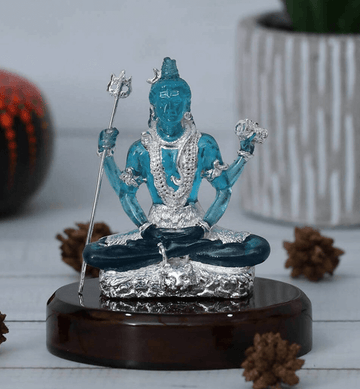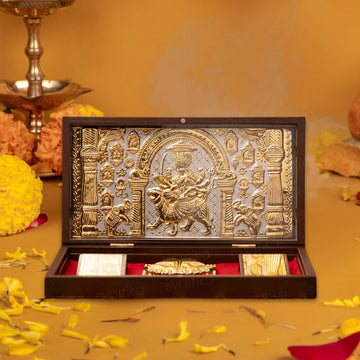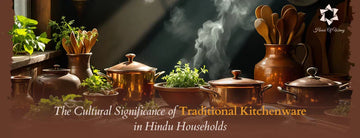"Annam na nindyaat, tad vratam"
Don't disrespect food; this is the vow.
Said in Taittiriya Upanishad, 1.11
Once food is offered to God, it becomes a prasadam, sacred food. But what about the vessel in which the offering is made?
Let us understand the importance of traditional cooking vessels in a Hindu household.
In most of Hindu households and culture, the kitchen is not just a space for preparing meals, but rather a place where culture takes breath, where blessings are added to curry, a place where each ladle is full of memory. We can often see our elders lighting a diya before cooking, separating pooja vessels from those used day-to-day, and washing their utensils with utmost care using holy water. These are not habits; these are practices stemming from generations.
Traditional Kitchenware: More Than Just Tools
Have you ever noticed how your grandmother holds on to that one old brass kadai or that dull-looking silver spoon she refuses to give away? That’s not just sentiment, it’s cultural truth. Traditional kitchenware in India is like family. They have been used for decades in celebrations, fasts, births, and prayers.
These vessels aren’t just about utility. The importance of Kalash and lota is way more than a vessel. A kalash filled with sacred water becomes a symbol of creation. A lota isn’t just for pouring, it purifies. Even a regular-looking thali takes center stage during poojas and prasadam offerings. Symbolism of metal utensils and tools connects us to dharma, to seva, to something far greater than the meal itself.
Ancestors knew the Religious value of kitchen items: Brass, Clay, Copper & Iron
Can we understand the reason behind why dal is always cooked in a clay vessel, or the reenergizing quality of water sitting in a copper lota all night? Our ancestors did not select materials randomly. They understood energy balance, the healing properties, and the Spiritual uses of kitchen tools
Let us also understand the Culture behind Indian kitchenware:
- Clay connects us to the earth, cools the food, and grounds our energy.
- Brass utensils significance spiritually charged and bacteria-free, and are therefore suitable for ritual.
- Copper, according to Ayurveda, pacifies the pitta and purifies the body.
- Eating from iron vessels adds iron to food, which can help to alleviate deficiency due to diet (especially in vegetarian diets).
Each vessel ages with us, collects its own stories, and enhances its energy.
How Kitchenware Reflects Ayurveda and Sattvic Living
In Ayurveda, health is not just about the food we eat, but also about how we eat, and in what we prepare it! Ever wonder why temple kitchens use big iron kadhais, or why traditional kitchens continue using old-looking vessels but never plastic?
To cook with a clay handi, to sip from a bronze tumbler is not just a blind religious practice; it is science, grounded in soul. These materials also preserve the sattvic quality of food, so every bite can be lighter, cleaner, and more life-giving. It becomes a way of living, where the way of cooking becomes a form of worship.
Incorporate this practice for a sattvic living :
- Use copper for eliminating toxins and balancing.
- For retaining prana, use clay or bronze.
- Do not use any synthetic or non-stick coatings that disturb the energy of the food.
- Cook from a potential calm, clean, and prayerful mindset.
Kitchen Rituals in Hinduism and Their Role in Daily Worship
The kitchen space in many Traditional Indian homes is more than a place for food preparation, it is a place for quiet, everyday rituals that possibly honor tradition. These rituals are not grand events.They are simple tasks, handed down from generations.
These are the simple rituals with great impact on daily worship:
- Lighting a lamp before we make food is a great way to get into a peaceful frame of mind, purify the space around us, invite auspiciousness into our lives, and honour God.
-
Animals and God's first bites remind us to be humble and thankful.
- Having separate pooja utensils maintains purity and also keeps clean and separate sacred items.
- Using Natural cleaning products, like ash or lemon, to clean metal cooking utensils, like brass or copper, helps vessels stay bacteria-free.
All of these rituals make us know or acknowledge that food is more than energy.
The Role of Kitchen Tools in Festivals and Poojas
During religious occasions, festivals, and celebrations, there are certain kitchen tools that emerge from their cabinets not as decorative, but as Spiritual uses of kitchen tools, a connection of the household with divine energy.
- Brass and silver thalis are used to serve prasadam offerings during Diwali, Navratri, and Janmashtami.
- Clay pots are used in Pongal, Holi, and for temple cooking.
- Special utensils such as kalash, diyas, or lota, are placed at entrances and the altar as a means to welcome nature and blessings.
The family often cleans and polishes these special utensils carefully, as a part of the pooja, later used for offerings and cooking.
Heirloom Utensils in the Kitchen
Many households carry Kitchen rituals in Hinduism that have Puja utensils and their meanings been passed down for generations. These Utensils are as functional as they were when bought, just because of care and the Religious value of kitchen items.
- A grandmother's iron tawa or brass spoon is now a keeper of tradition and love, and memories.
- Kitchen Gift Items, like a kalash or copper vessel, are often gifts you find at weddings and housewarmings.
-
These items embrace legacy, continuity, prosperity, and blessings of family.
Eco-Friendly and Sustainable Aspects of Traditional Utensils
For centuries, Hindu kitchen traditions have created sustainable ways of cooking by using natural materials, creating less waste, and using kitchen tools that last for years.
What are the elements of Eco-friendly Hindu kitchenware?
- Clay pots and pans are made of earth, and they are organic.
- Copper and bronze cookware last for years and are recyclable.
- There are no plastics or toxic coatings with clay cookware, which also renders their meals safer and more natural.
This allows traditional cookware to be both eco-friendly and spiritually aligned.
Regional Variations in Traditional Kitchen Practices
The variations of materials and utensils in different regions of India differ due to the type of food being cooked, the climate of the region, and traditions.
- Kerala: Uses bronze urulis for temple sweets and festive cooking.
- Bengal: Uses kansa (bronze) thalis for pooja and meals.
- Gujarat: Uses clay matkas for water and rustic cooking.
- Tamil Nadu: Uses copper and iron vessels for herbal recipes and rituals.
Each region adds its regional flavor to the Traditional kitchenware in India.
Preserving Cultural Identity Through the Modern Kitchen
Even in today's modern homes, integrating tradition and contemporary practices as part of your routine can be easy to carry forward. Many families now incorporate Traditional cooking vessels into their daily practices, and it can elevate the meaning of your kitchen.
- Use a copper bottle for your drinking water every day.
- Have a brass kalash or lota near your pooja or entrance.
- Cook with clay pots at least once a week to connect with the earth.
- Use Vastu tips for kitchen utensils, such as storing metals in the west or northeast portions of your home.
These little decisions matter when it comes to holding onto your cultural identity.
Top 10 Utensils Used in Kitchen

Final Take
In Hindu households traditional cooking vessels is more than just a cooking choice it’s a connection to divine peace, health, and cultural values. Each vessel, brass thali or clay pot, holds blessings and rituals from generations.
"Yad yad ācarati śreṣṭhas tat tad evetaro janaḥ"
Whatever action a great man performs, common men follow in his footsteps. Bhagavad Gita 3.21
Let’s take those footsteps. Let us make our kitchen a space of care, memory, and sacred intention, not just a space for cooking, but a space to express and live our culture on a day-to-day basis.










